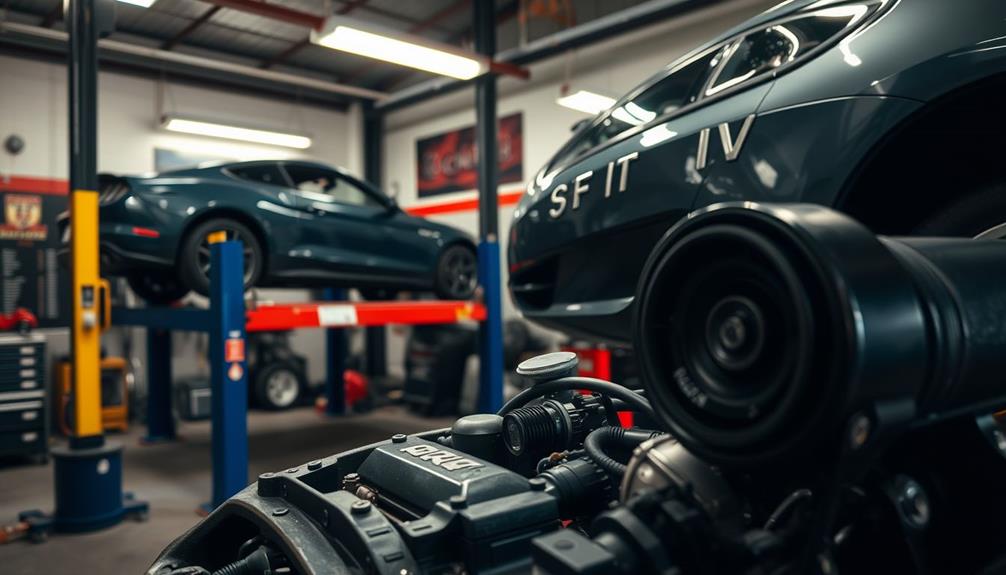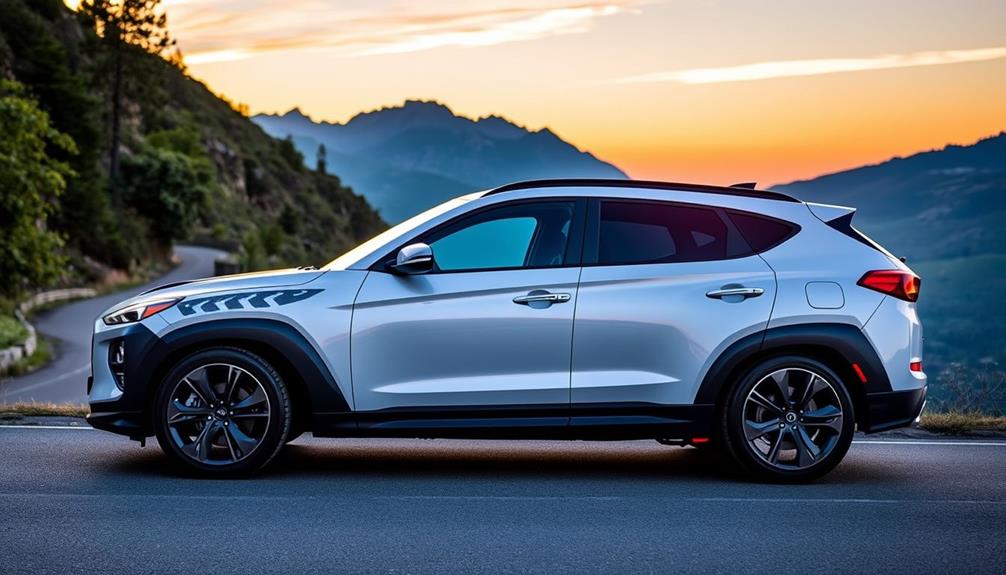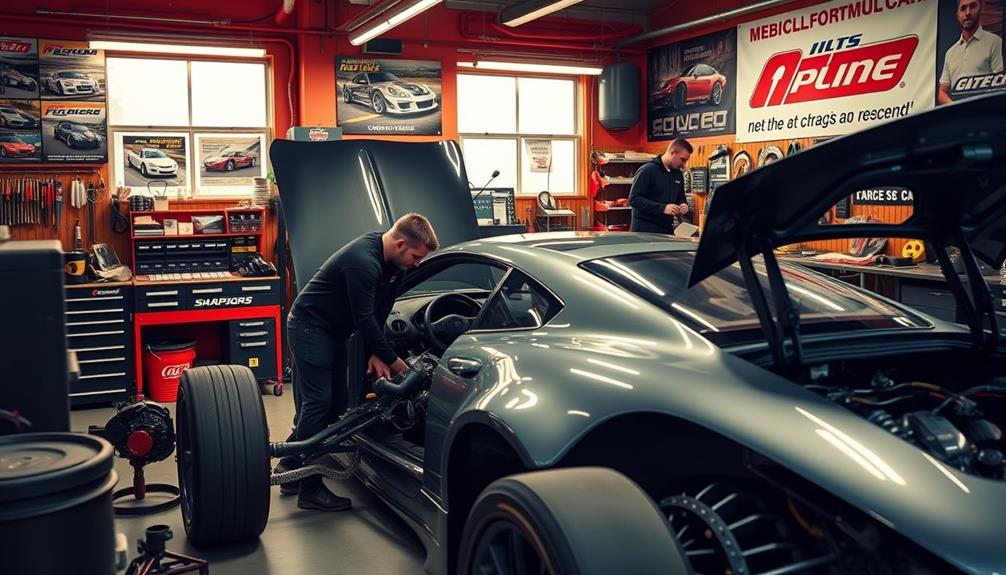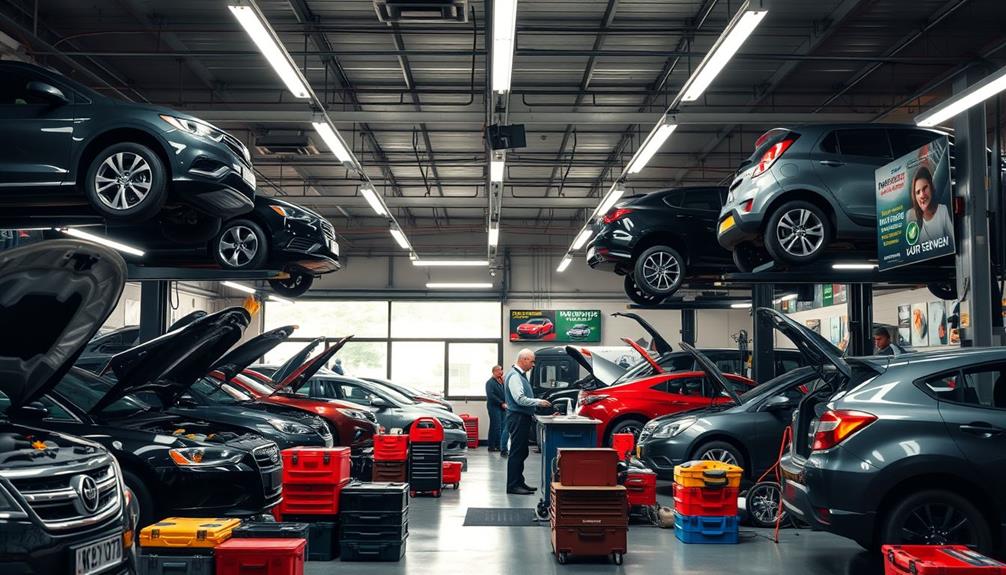Car tuning services can range greatly in cost, so it's important to know what to expect. Basic tuning might set you back between $200 and $400, while ECU remapping generally costs between $300 and $800. If you're looking for a professional dyno tune, prepare to spend between $200 and $1,000, depending on complexity. Major performance upgrades can escalate prices from $1,000 to $10,000. Plus, there are DIY options for those wanting to save. Understanding these expenses helps set realistic expectations, and exploring further can reveal even more insights into your tuning journey.
Key Takeaways
- Basic car tuning ranges from $200 to $400, covering standard maintenance and minor enhancements.
- ECU remapping costs between $300 and $800, depending on vehicle specifications and needs.
- Professional dyno tuning typically costs $200 to $1,000, influenced by the complexity of modifications.
- Major performance upgrades can range from $1,000 to $10,000, including extensive engine modifications.
- DIY tuning options, like changing filters or installing cold air intakes, can save costs, typically ranging from $20 to $500.
Types of Car Tuning
When you think about car tuning, you might be surprised by the variety of options available to enhance your vehicle's performance and appearance.
There are several types of tuning you can explore, each focusing on different aspects of your ride.
Engine tuning is a popular choice, involving modifications that improve acceleration, torque, and overall power. This can include ECU remapping, which can greatly boost fuel efficiency.
For those looking to make their car stand out, body tuning offers aesthetic upgrades like body kits and spoilers.
If you're interested in improving handling and stability, suspension tuning is essential, especially for racing applications. Basic coilover kits can give you a solid start.
Another exciting avenue is dyno tuning, where a dynamometer is used to optimize your vehicle's performance based on real-time data. This process guarantees that any performance upgrades are fine-tuned for maximum impact.
Lastly, stage tuning provides a roadmap for performance enhancements, ranging from simple tweaks to extensive modifications like forced induction or engine rebuilds.
Each type of tuning caters to different goals, so consider what fits your needs best!
Cost Breakdown of Tuning
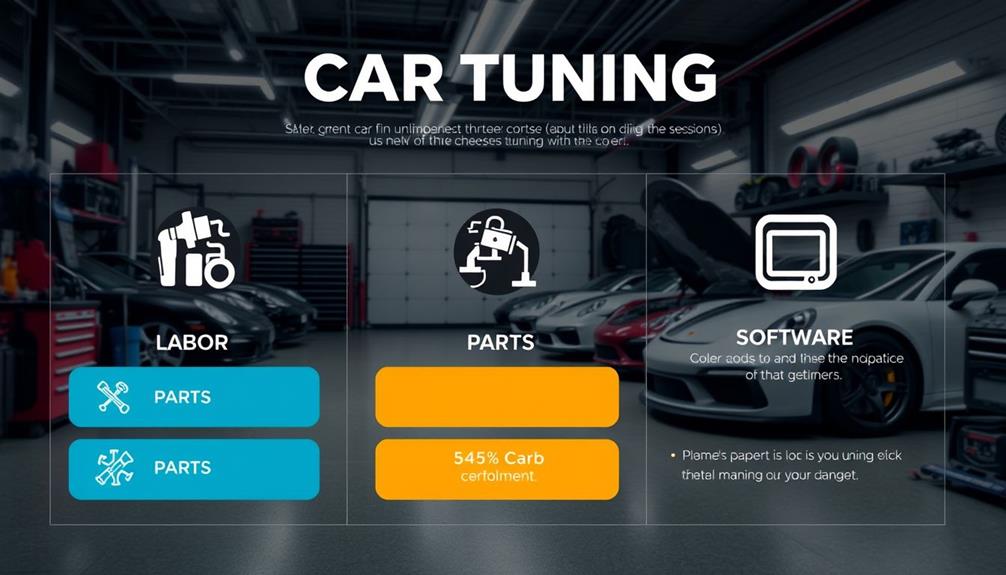
Understanding the cost breakdown of car tuning is essential for anyone looking to enhance their vehicle. When exploring tuning services, you'll find that basic tuning generally ranges from $200 to $400. This includes standard maintenance and minor performance enhancements.
If you're considering ECU remapping, expect to pay between $300 and $800, depending on your vehicle's specific needs.
For those seeking a professional dyno tune, costs can vary considerably, typically falling between $200 and $1,000, influenced by the complexity of your desired modifications.
Performance upgrades, like engine rebuilds or extensive modifications, can be a major expense, often ranging from $1,000 to $10,000.
If you opt for a custom tune, this can add to your overall expenses as well. Additionally, if you need tuning devices such as handheld tuners, budget around $300 to $400 extra.
DIY Car Tuning Options
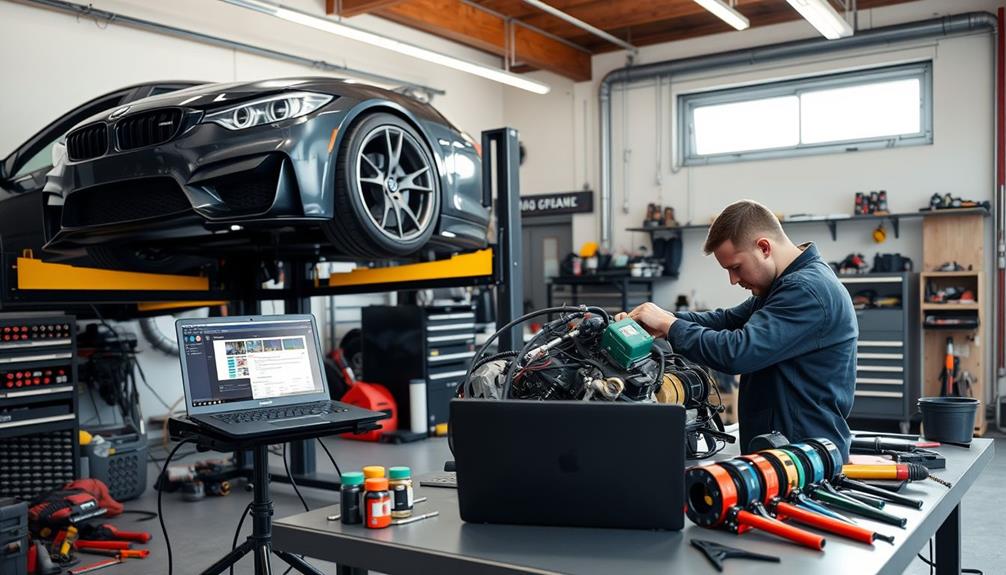
DIY car tuning options offer an exciting way for enthusiasts to enhance their vehicles without breaking the bank. Tuning involves a range of modifications you can tackle at home, letting you improve power and performance while saving money.
For starters, basic tasks like changing spark plugs or replacing the air filter can cost anywhere from $19.95 to $100 for materials.
If you're looking to boost your engine's performance, installing cold air intakes is a popular choice, typically priced around $150 to $500. Additionally, lowering springs can enhance handling and are available for approximately $350, making them an appealing option for DIY enthusiasts.
For those comfortable with technology, you might explore software updates for your engine control unit (ECU). These updates can often be accessed via USB or over-the-air (OTA), allowing you to avoid dealership costs that usually range from $100 to $300.
Before diving into tuning your car, thorough research and preparation are key. Understanding the costs and benefits can help guarantee that your modifications are successful and free from unexpected expenses, setting you on the right path to achieving your tuning goals.
Benefits of Car Tuning
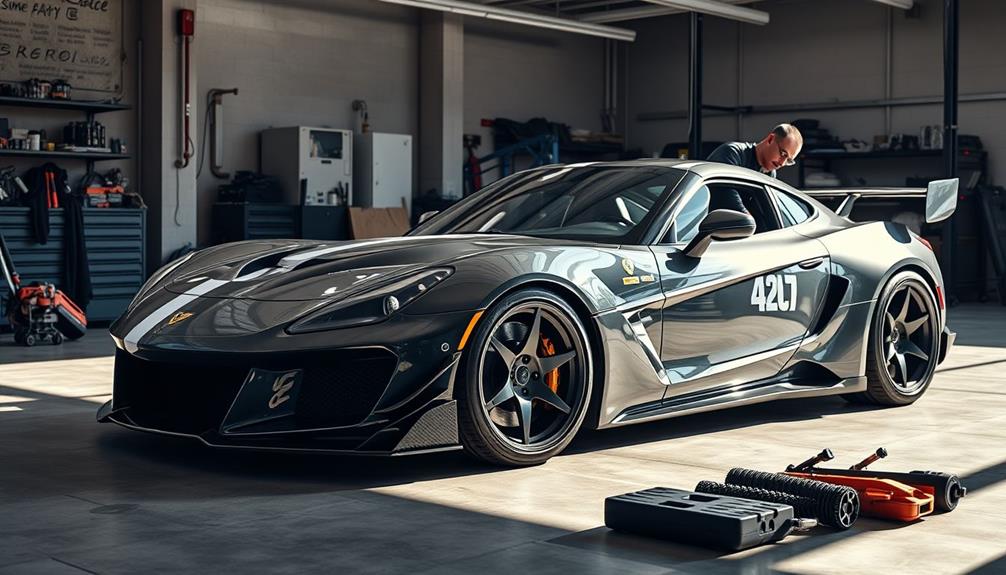
Car tuning often provides considerable benefits that can elevate your driving experience. You can expect an increase in horsepower by 10-30%, which translates to better acceleration and overall performance. With optimized tuning, especially through adjustments to the engine control unit (ECU), you'll enjoy better fuel economy, helping save on gas costs and reducing your environmental footprint.
Personalization is another perk of car tuning. You can tailor your vehicle's performance to fit your unique driving style, making every ride more enjoyable. Additionally, well-tuned vehicles often attract higher resale values, appealing to buyers seeking enhanced performance beyond factory specifications.
Another essential aspect of tuning is upgrading suspension components. This can notably improve handling and stability during cornering, leading to a safer driving experience.
Here's a summary of the benefits:
| Benefit | Description |
|---|---|
| Increased Horsepower | Up to 30% more power for better acceleration |
| Better Fuel Economy | More efficient combustion saves gas costs |
| Personalization | Tailor performance to suit your driving style |
| Improved Handling | Enhanced stability from upgraded suspension |
Vehicle Preparation for Tuning
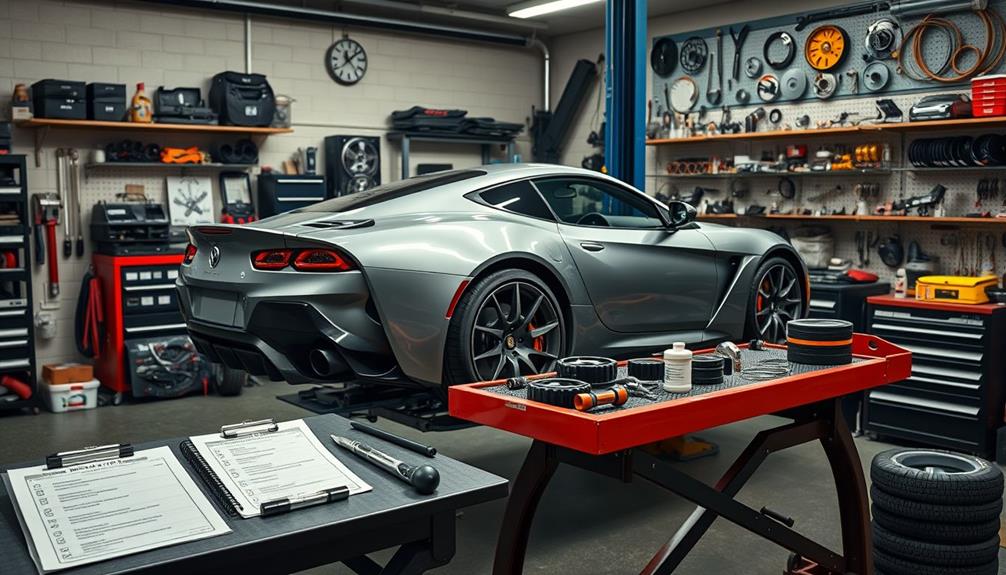
Before diving into the tuning process, it's important to guarantee your vehicle is in prime condition. Proper vehicle preparation for tuning can greatly impact the results you achieve.
Regular maintenance is essential, especially if you're dealing with high-mileage vehicles. You won't see the desired tuning improvements if your vehicle hasn't been well cared for.
Here are three key steps to confirm proper preparation:
- Conduct a Vehicle History Check: Checking the VIN can reveal crucial information about prior damages and mileage discrepancies. This knowledge is significant for informed tuning decisions.
- Address Wear and Tear: Replace worn-out shocks or struts to make sure your vehicle delivers optimal performance after tuning. Neglecting these issues can undermine your tuning efforts.
- Change Fluids and Filters: Verify that fluids, filters, and spark plugs are fresh. This foundational work sets the stage for a successful tuning process.
Frequently Asked Questions
How Much Does It Cost to Fully Tune a Car?
To fully tune your car, expect to spend anywhere from $1,000 to $10,000. Factors like your vehicle's make, model, and the extent of modifications will determine the final cost. Consider your performance goals when budgeting.
Is It Worth Getting Your Car Tuned?
Imagine releasing a beast; tuning your car can transform your ride's performance. If you crave that thrill and efficiency, it's worth it. Just remember, regular maintenance keeps your dream machine roaring smoothly and reliably.
How Much Does a Tune Go For?
A tune typically costs between $200 and $800, depending on the type of service you need. Basic tunes are more affordable, while custom options for modified vehicles can push the price higher.
What Does a Tune up Consist of Cost?
A tune-up typically consists of replacing spark plugs, changing air filters, and checking fluids. You can expect to pay between $200 and $400 for these essential maintenance tasks, ensuring your vehicle runs smoothly.
Conclusion
In the world of car tuning, think of your vehicle as a musical instrument. Just as a skilled musician fine-tunes their guitar for the perfect sound, you can enhance your car's performance for a smoother ride. Whether you choose professional services or take the DIY route, investing in tuning transforms your vehicle into a symphony of power and efficiency. Remember, every dollar spent is a note in your car's masterpiece, creating harmony between you and the road.
